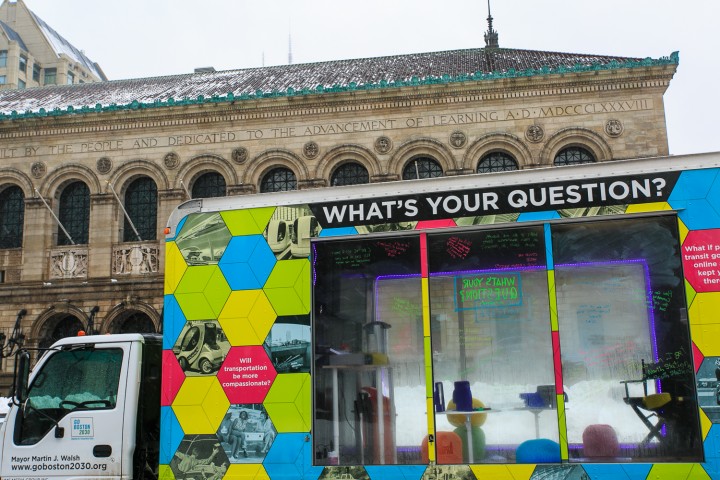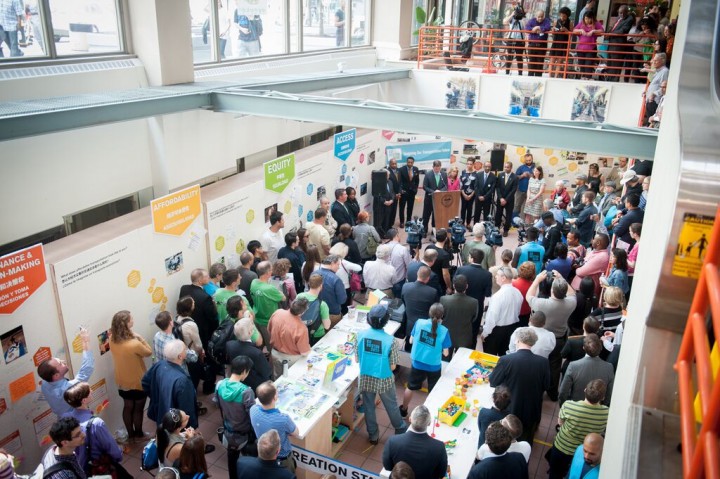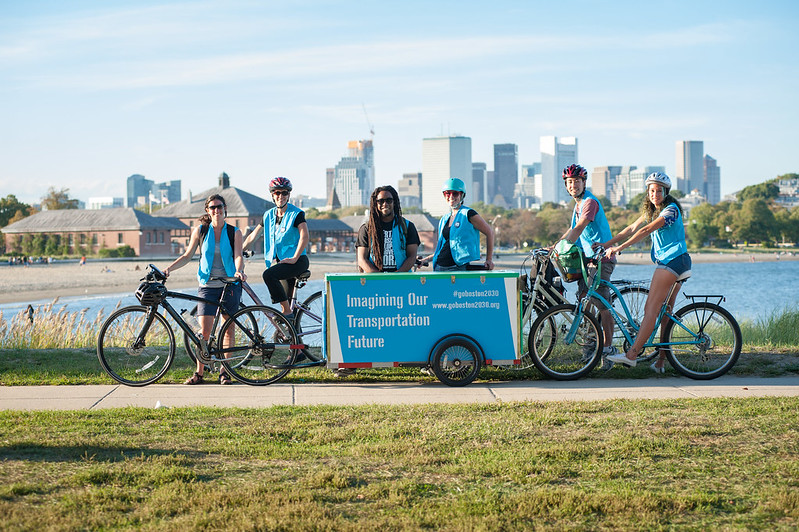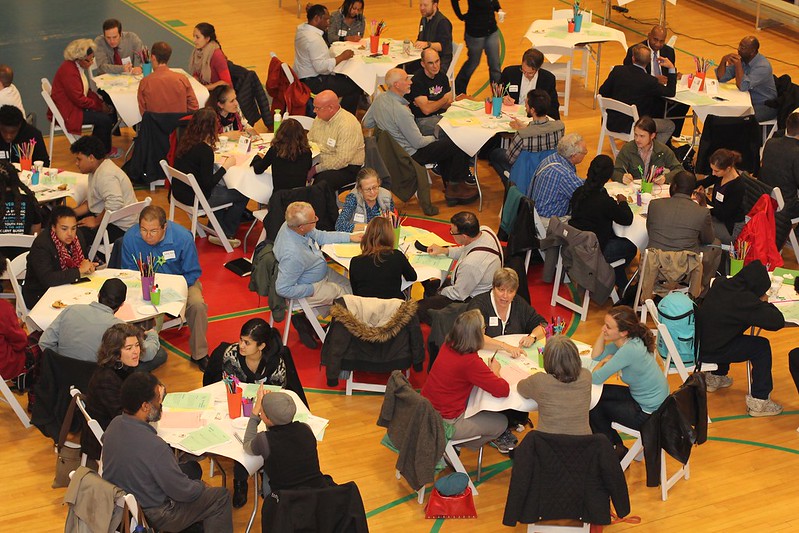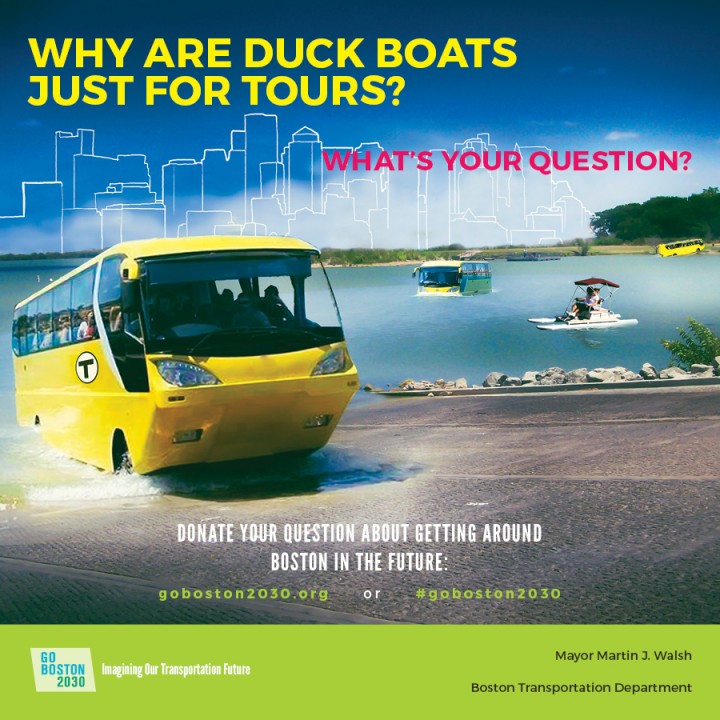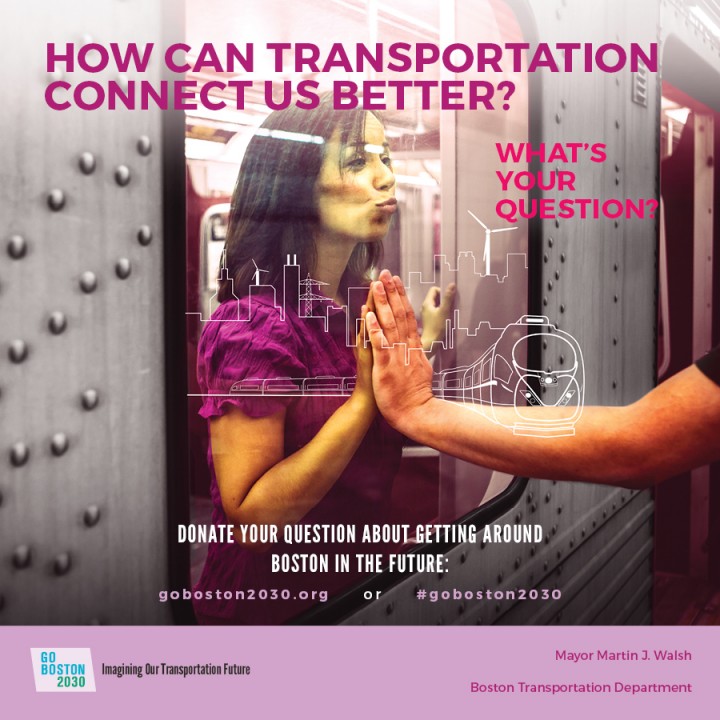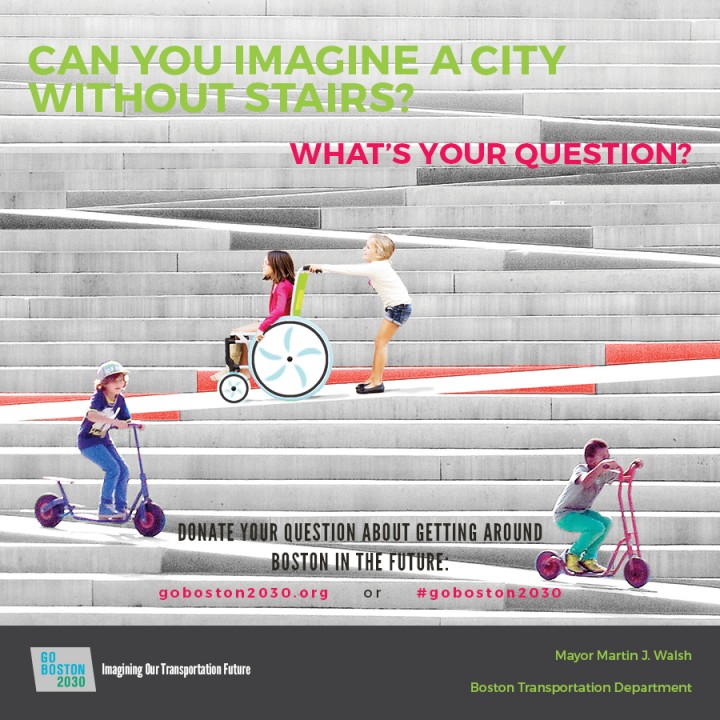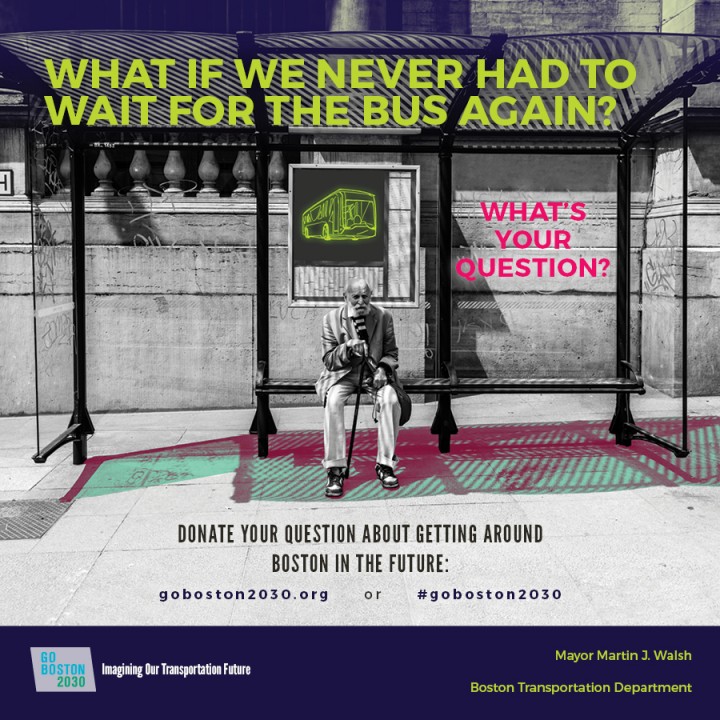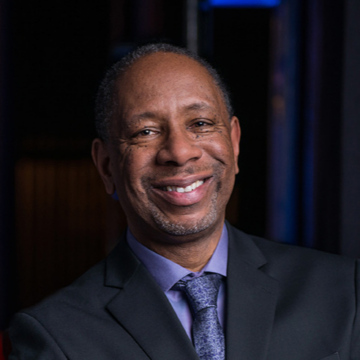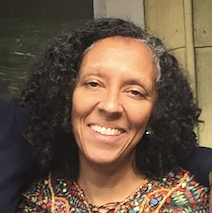Boston has a “new gold standard in public engagement”
IISC leads public engagement for Boston’s transportation future
“Go Boston 2030 is a City of Boston initiative to envision a bold transportation future for Boston for the next 5, 10 and 15 years. The plan will develop a far-reaching vision that proposes transformative policies and projects to improve transportation for the city’s residents, businesses, and visitors. The two-year process will be driven by data and steered through an unprecedented and inclusive public engagement process.”
IISC designed this process so that the public framed the vision and was involved in ideation. See the story of public participation. This project is still underway.
In the News
- Boston’s transportation planning can be fun, Boston Globe
- Boston planners tap commuters to shape ideas for 2030, New Boston Post
- Go Boston 2030 truck solicits commuter questions, Boston Metro
- Mayor Walsh Opens Go Boston 2030 Vision Lab, Boston News Group
- Boston’s transit wish list, Boston Globe
- Boston’s Transportation Future? City Releases Report Detailing Public’s Transit Goals, WBUR
Boston Seeks a Public Vision
“The City of Boston launched Go Boston 2030 to better understand the public’s aspirations for transportation throughout the city and to build a bold, innovative transportation future based on an unprecedented level of public engagement,” said Mayor Walsh. “Our transportation Action Plan will lay out an ambitious roadmap to address inequities in underserved neighborhoods, connect our workforce to job opportunities, and prepare our systems for climate change.”
“The Go Boston 2030 initiative is using the latest technology and real grass roots activity to achieve an unprecedented level of community engagement. We’re hearing directly from a broad group of people about what their needs and hopes are for Boston’s transportation future,” said Mayor Walsh. “Together, through this initiative, the public and city officials will build a bold and innovative plan that will improve mobility for residents, commuters, and visitors.”
IISC Designs and Delivers Public Engagement Process
IISC President Ceasar McDowell described the process during a keynote at Grantmakers for Effective Organizations (GEO), reflecting on city planning as an opportunity to build democracy.
Senior Associate Andrea Nagel reflects on IISC Blog about the process.
Question Campaign and Question Review Session
IISC and the city collected over 5,000 questions and touched every neighborhood in Boston. We did this by letting people submit a question in a way that makes sense to them and meeting people where they are.
For example:
- People could submit questions via text, email, handwritten cards, Tweet, Instagram, Facebook, and other ways.
- We designed an interactive glass truck that went to 15 neighborhoods.
- We used digital media to publicize on the city’s social media pages, built a following, and attracted thousands of questions.
- We had over 80 partners from city agencies to grassroots organizations committed to bringing their networks into the campaign.
- We participated in existing events all over the city.
As the questions came in, they were organized by emerging themes and zip code, and made available for viewing on the website. But how do you move from 5,000 questions to something people can anchor around and build a vision? The Question Review Session was a half-day convening of city officials and community leaders who reviewed all of the questions and worked together to understand and articulate what the public was saying. Participants identified sets of questions that best represented what was most recurrent, provocative, and visionary amongst everything people had said.
Visioning Lab
Next came the Visioning Lab, a place for people to share their vision of our transportation future. It was designed to test the resonance of the themes, questions, and vision ideas that emerged from the Question Campaign and Question Review Session. People were invited to answer some of the key questions and to articulate how they imagine seeing each vision idea come to life.
The Go Boston 2030 Visioning Lab took place on May 8 and 9, 2016 at the China Trade Center. Building on the Question Campaign, we asked the public to help us to develop a big vision for the future of mobility. The event was free and open to the public. What people wrote on the walls, designed at the Creation Station, and “liked” with stickers and tokens was used to guide the development of goals and targets for the Vision Report.
Results from this process are published in the draft report, which is available for download at Go Boston 2030.org.
Share Your Trip
“Share Your Trip with BTD” is a part of the Go Boston 2030 initiative that pairs people who work for the Boston Transportation Department with people who live and work in Boston who have volunteered to tell their stories about getting around the City. Combined with project and policy ideas collected this fall at “Ideas on the Street” pop-ups as well as data analysis about future demand, these stories are designed to form the narrative backbone of the Action Plan phase.

Ideas on the Street
The Ideas on the Street pop-up visited 31 neighborhood locations between September 19 and October 21, 2015. The expandable bike trailer collected project and policy ideas on paper maps and Members of the street team talked with people at events, square, and T stations across the city. An online platform also allowed people to share their project and policy ideas with words and maps using the smart phones or computers. Over 2000 ideas were collected.
Idea Roundtables
On November 10, November 14, and November 19, Go Boston 2030 hosted three interactive conversations about the future of transportation. Participants sat with people from other neighborhoods and discussed possible ways to address the challenges facing our transportation systems.
Ads will ran on public transit and in neighborhoods, in addition to on the ground question collection by staff and network partners.
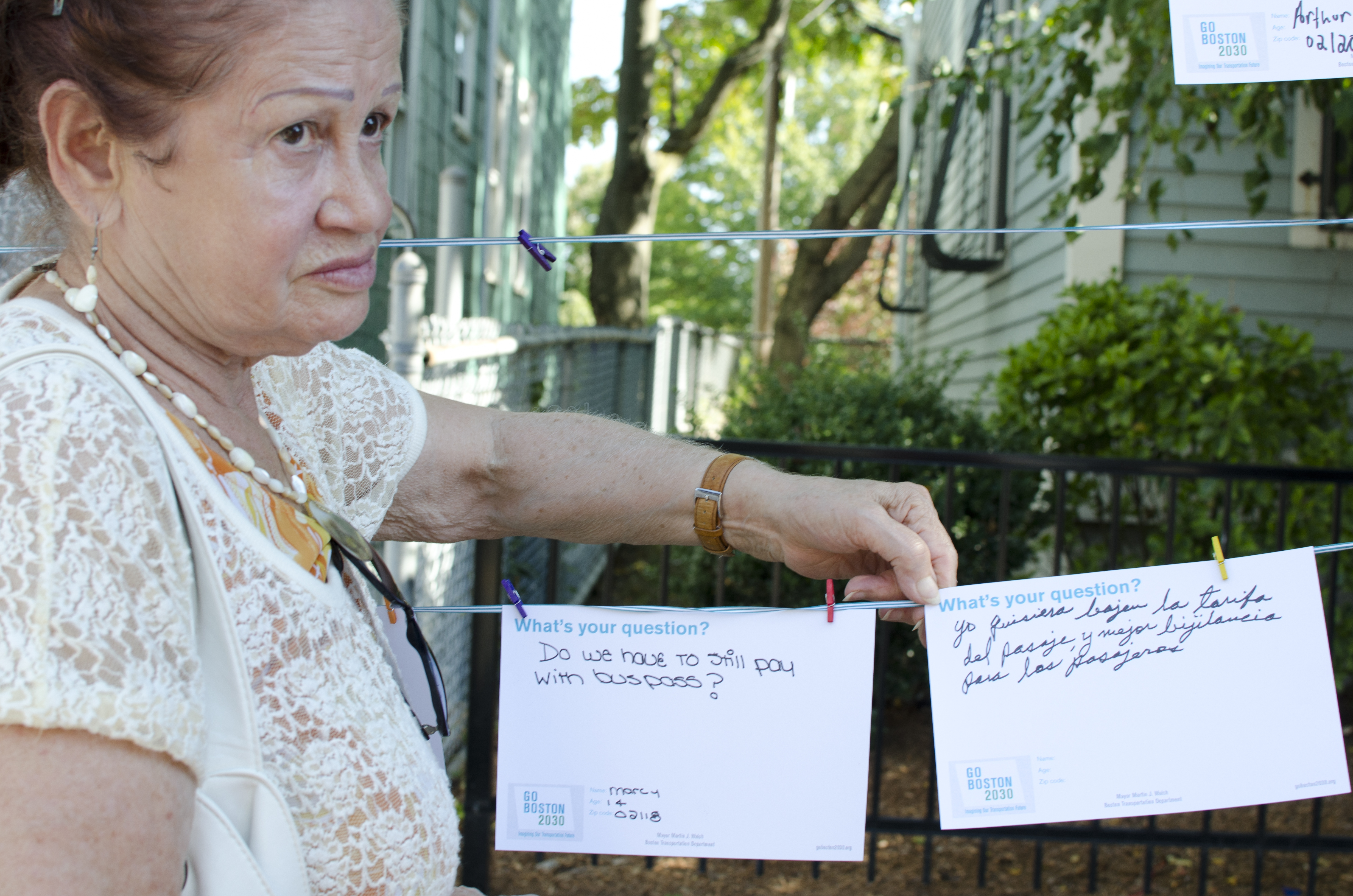 Go Boston 2030 collects questions at Open Streets event on Blue Hill Ave. in Roxbury.
Go Boston 2030 collects questions at Open Streets event on Blue Hill Ave. in Roxbury.
#goboston2030 Tweets
